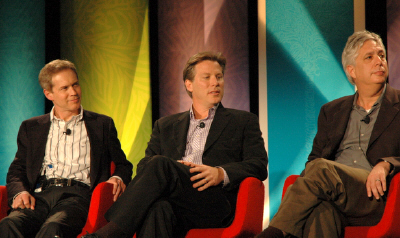Hollywood trying to play by new rules

Ross Levinsohn, president of Fox Interactive Media at News Corp, says that the multitude outlets--TV, syndication, DVD, Internet download, mobile phones, VOD, subscription--is changing the game. "Instead of taking programming and putting it on TV, now we have seven or eight different opportunities and all have revenue attached...for this town there are great opportunities if we don't make mistake of thinking of all the ways it can't be successful or legal reasons we can't succeed," Levinsohn said.
Marginal content can go direct to consumer via VOD, MySpace (owned by News Corp) or other sites, he added. "The economics of this town have to change." If one of the handful of mainstream distributors of video content doesn't pick up a program, Web sites could deliver even bigger audiences. The most viewers on a cable show is about 4 million, Levinsohn said, and sites like MySpace, YouTube, Yahoo and MSN get the same number of viewers. "The ads haven't followed, but the audience is there," he noted.
Levinsohn was speaking during the OnHollywood "Oh My! How The Rules Have Changed" panel, which also included Ben Feingold, President, Worldwide Home Entertainment, Digital Distribution and Acquisitions for Sony Pictures Home Entertainment; and Blair Westlake, Corporate Vice President, Media, Content & Partner Strategy Group at Microsoft. The moderator was Gary Adelson, Managing Director, Houlihan Lokey Howard & Zukin.

From left: Blake Westlake (Microsoft), Ross Levinsohn (News Corp), Ben Feingold (Sony)
Sony's Feingold said that existing revenue bases and types of programming will continue. "The studios will add new creative groups to make products as they did with TV and DVDs and now with the Internet," he said. "There will be some market settlement. The Internet is more for niche programming and a tools to add efficiency and marketing of traditional content."
Microsoft's Westlake talked about the changes that will occur when instead of roughly 100 channels and 2500 hours of daily programming there are 25,000 to 45,000 choices of content. "I bet if you have 25,000 channels it will change how people watch. Coupled with the evolutoin of the end of exclusivity, the [old] world is slowly coming to an end.
Levinsohn pointed to MySpace as an example of the new world. "We don't spend time creating content and have the fastest growing [content site]. Some of it is good...MySpace has a million bands, but 90 percent won't get a record deal. It's not that different from American Idol...finding new starts everyday whether bloggers, vloggers or producers of different kinds of content and getting instant distribution on MySpace."
Someone from the audience asked if anyone was buying YouTube. Levinsohn responded that News Corp has a two-pronged approach. "MySpace is uploading as many videos as anybody, and Fox Digital Media Distribution is going to be in many places at once," he said. I guess that means for now YouTube is either too pricey, not for sale or not of interest. By the numbers, YouTube is serving 40 million videos per day, uploading 35,000 per day and has 6 million daily unique users, according to Nielsen/NetRatings.